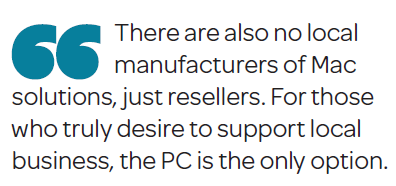PC, the Way to Be



WHY IS THE PC BETTER THAN THE MAC? As an owner of a technology provider that manages Windows networks, you would think I could make a pretty compelling argument in favor of the PC, right? A few years ago I might have accomplished that task more convincingly.
Let me put all my cards on the table: I own an iPad and MacBook Pro. There, I said it. It feels pretty good to put that out in the open. Don’t get me wrong, I also have a Windows-based PC and laptop, and for good measure my smart phone is an Android.
Has the Mac vs. PC question become as antiquated as dial-up Internet? In my household, there is an obscene number of devices that are capable of checking email and updating Facebook. The relevant question these days might be: Which device is best for my specific needs? I love jumping on my iPad for games and movies but don’t enjoy typing or creating content with it. The good news is that we don’t have to settle for one or the other. In a world divided between Republicans and Democrats, Christians and Muslims, Coke and Pepsi, can we at least come together and agree that a computer is a computer, and it doesn’t really matter what operating system you are using?
No, probably not. So let me detail a few reasons why a person or business would choose a Windows-based PC platform over a Mac:
1. Cost. Let’s face it; you can get a lot more horsepower out of a PC for the money spent than you can with a Mac. Customers often tell us that all they want to do is email and check Facebook. Why spend $1,399 on a Mac when you can do the same for $499 on a PC?
2. Compatibility. Before any of you Mac fans go crazy and try to run me down in your Prius or attempt to choke me with your sweater vest, give me a minute to clarify: Businesses use software. Medical has EMR; accounting, law and other industries have their own packages. We often integrate new solutions for these businesses. Overwhelmingly, at least at present, business and productivity software is designed to run on Windows. Mac doesn’t exactly have a response to Exchange or SQL. That’s just not its thing. So you can buy a PC and know it will work or buy a Mac for 50 percent more money, buy a license for a program that will virtualize Windows on a Mac, buy a license for Windows and hope that it will run. Did I mention standing on one leg and holding your head to the side when you launch the program? You should have just stuck with the PC.
3. Service. PCs are easier to upgrade, there are more forums and tutorials online and more local support companies that can help with any PC-related issue. There are also no local manufacturers of Mac solutions, just resellers. For those who truly desire to support local business, the PC is the only option.
4. Customization. Because there are more PC manufacturers, you will find more options and combinations of components and peripherals in the PC world.

Truthfully, now that Mac uses the same hardware as the PC, there are even fewer differences between them. That being said, I don’t think I would be doing justice to the PC if I didn’t defend some of the criticisms that Mac users typically use:
1. Stability. We remember the days of the blue screen in Windows XP. If we’re going to be fair, we can’t make an argument based on 10-year-old technology. I have never had a blue screen on either of my Windows 7 systems, and both of my Apple devices have locked up, crashed and required reboots to fix various glitches and/or problems.
2. Viruses. Although I will concede that viruses and spyware are more of a problem on a PC, the reason is not that the iOS is impenetrable. According to an article on CNN.com, Windows-based PCs are currently being manufactured at a 20-1 ratio over Macs. This is the narrowest margin since 1996. So, yes, Macs are becoming more popular, but the number of Macs doesn’t approach the number of PCs in the global market. Nearly 90 percent of the world’s computers run Windows, while only around 5 percent are Mac computers. If you are intending to infect computers with viruses and spyware, are you going to put your resources into affecting 90 percent of the world’s computers, or will you disregard the numbers and focus on Macs? If that hurts your feelings, don’t worry. As the production gap closes you will see more and more infections on your Mac.
3. Reliability. In a recent study, Square Trade, a company that sells extended warranties on computers, reported on failure rates of laptops. According to their studies, when compared to eight of the top laptop manufacturers, Apple came in fourth, right behind Sony and barely ahead of Dell.
So what does this all mean? If you need to do something that requires a PC, buy a PC. Otherwise, talk to some people, try them both out, and go with what you prefer. If you have the means and the interest, buy one of each. Each technology has something to offer. Can’t we just all get along?


